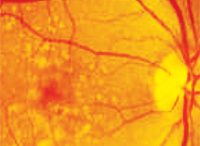Women with healthy diets who regularly exercise and do not smoke are more than two-thirds less likely to develop age-related macular degeneration, according to a study in the December 13 online edition of Archives of Ophthalmology.

Women who have the healthiest diets are about half as likely to develop early AMD compared to women with the most unhealthy diets. Image: Mark T. Dunbar, O.D.
These findings were garnered from the Carotenoids in Age-Related Eye Disease Study (CAREDS), which evaluated the protective effect of carotenoid compounds against age-related ocular diseases in 1,313 women aged 55 to 74 years.
In CAREDS, the participants completed self-reported dietary/lifestyle questionnaires at baseline, which revealed information about daily whole grain, vegetable, fruit, dairy, saturated fat, sodium and added sugar intake as well as approximate levels of regular physical activity. Upon questionnaire completion, the researchers categorized dietary scores and activity levels into quintiles.
At the completion of the study, women whose diets scored in the highest quintile were 46% less likely to develop early AMD than women with dietary scores in the lowest quintile.
Additionally, women in the highest quintile of physical activity levels were 54% less likely to develop early AMD than women who exercised infrequently or not at all.
Smoking, by itself, was not documented as a particularly strong indicator for AMD in this study. However, the researchers determined that women who were in the highest dietary and exercise quintiles and had no history of smoking were 71% less likely to develop AMD.
“Adopting these healthy habits may markedly lower the prevalence of early AMD, the number of people who develop advanced AMD in their lifetime, and healthcare costs associated with treatment for this condition,” writes lead author Julie A. Mares, Ph.D., professor in the Department of Ophthalmology and Visual Sciences at the University of Wisconsin. “The results also serve to remind us that risk for AMD is passed to subsequent generations not only through genes but also possibly through the lifestyle habits we model and encourage.”
Mares JA, Voland RP, Sondel SA, et al. Healthy lifestyle related to subsequent prevalence of age-related macular degeneration. Arch Ophthalmol. 2010 Dec 13. [Epub ahead of print]

